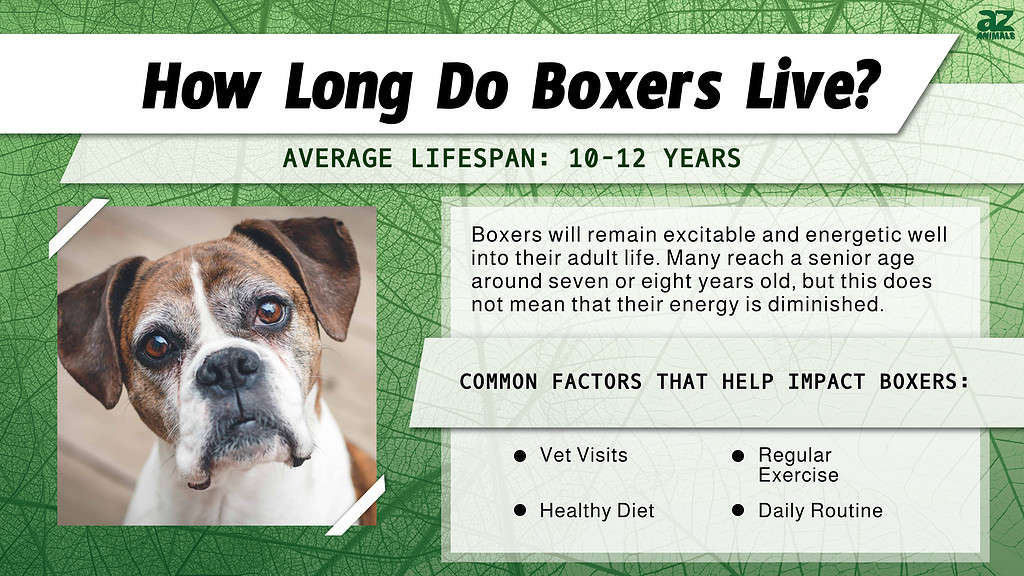
Known for their friendly personalities and adorable faces, boxers are a popular large dog breed. But how long do boxers live, and what is their life like? If you have recently adopted a boxer, or perhaps just want to learn more about dog breeds, you’re in the right place.
In this article, we will discuss the average life cycle of this friendly breed as well as what you can expect of the boxer’s lifespan. We will even include some helpful tips for your new pet boxer so that you can extend their lifespan. Let’s get started.

Known for their friendly personalities and adorable faces, boxers are a popular large dog breed.
©Tara Lynn and Co/Shutterstock.com
How Long Do Boxers Live?
Boxers live 10-12 years on average. They are a fairly hardy breed of dog, known for their bravery, loyalty, and sweet dispositions. They are considered a large breed of dog as well, with some male boxers reaching almost 80 pounds when fully grown.
This is likely why the boxer’s life span is closer to 10 years rather than 15. Most large dogs live shorter life spans than small dogs. Scientists and researchers don’t really know why. Usually, large animals live longer than small ones, but this is not the case with dogs. Some boxers have lived unusually long lives though, so don’t get discouraged!
Boxers are technically classified as working dogs more often than not. Their high intelligence and large body make them ideal for a wide variety of activities. They have been used in the past for carrying cargo, working as police dogs, and even guide dogs.
Boxers are usually very friendly dogs, especially toward humans. They seem to understand their place in a pack environment, and it is important to keep them both physically and emotionally satisfied. They need plenty of exercise, and you should take care to not leave them alone for very long.
The Average Boxer Life Cycle

©iStock.com/Annet Oldenkamp
Curious to learn what the average boxer’s life cycle is like? From newborn puppy all the way to senior adulthood, the average boxer’s life cycle isn’t very different from other dogs. But let’s learn more about what makes these dogs special.
Newborn Pup
Like all puppies, boxers are born without fur and without the use of their senses. They are completely reliant on their mother for the first two to four weeks of their life. As the weeks’ progress, they will open their eyes, and ears, and their nose will also be activated.
Boxer puppies begin playing as early as 3 weeks old. Some may be more excited about this than others, and you will already begin to see all of the different personalities present in your litter of boxer puppies.
After only a month, your boxer puppy will likely be interested in forming bonds with both its litter mates and the humans in its life. While puppies are notoriously uncoordinated, boxers will begin to learn how their bodies work during this time as well.

Boxer puppies begin playing as early as 3 weeks old.
©cynoclub/Shutterstock.com
Adolescent Dog, or Puppy
Your boxer will likely be considered a puppy well into its first year of life. They will be excitable, curious, and eager to please. Boxer puppies are very intelligent and easy to train. This is a good thing, as it is important to train large dogs so that they don’t hurt anyone or themselves while playing.
Your boxer puppy will also begin teething during this time, so it is important to always have chew toys around in case they are feeling destructive. For the most part, boxer puppies need exercise and socialization the most, but this is a fairly easy thing to get for them. They are very friendly and enjoy the company of many different people and animals.
Adult Boxer
Given the size of most boxers, they are often not considered adults or fully grown until they have reached 2 years of age. However, most boxers reach sexual maturity closer to 9 or 12 months of age. You should consider spaying or neutering your pet boxer, as this can help extend their lifespan.
Boxers will remain excitable and energetic well into their adult life. Many reach a senior age around seven or eight years old, but this does not mean that their energy is diminished. No matter the age that you adopt a boxer, they will remain a steadfast and loyal part of your family for the entirety of their life.

Boxers will remain excitable and energetic well into their adult life.
©iStock.com/Amanda Woldt Photography
How to Extend the Lifespan of Your Pet Boxer
If you’ve recently adopted a boxer, at any age, you should know how you can best extend the lifespan of your new family member. Here are some helpful tips for extending the lifespan of your pet boxer:
- Start a routine early. All dogs love routines and schedules, whether it seems like it or not. Your pet boxer is no exception. Given the high intelligence of this breed, they will likely appreciate a set schedule and a routine that they can count on, just like people. This includes daily feedings, walks, and playtime. These activities should occur at roughly the same time every day so that your boxer feels safe and cared for.
- Monitor your boxer’s weight. All dogs struggle with obesity in some shape or another, and your boxer is no exception. Given the large size of this particular breed, it is important for you to maintain a healthy weight throughout their entire life. You can accomplish this through high-quality food and regular exercise. Setting these goals early on in your boxer’s life is one of the most important things you can do to extend their lifespan.
- See a veterinarian regularly. If you are able to take your boxer to the same vets for its entire life, this can be especially beneficial for your boxer’s lifespan. Your veterinarian will get to know your dog just as well as you do, and they have a lot of professional expertise when it comes to taking care of your dog. Trust them and form a relationship with them for optimal success!
The photo featured at the top of this post is © iStock.com/Annet Oldenkamp
Thank you for reading! Have some feedback for us? Contact the AZ Animals editorial team.






